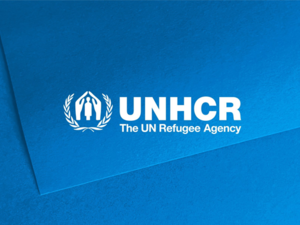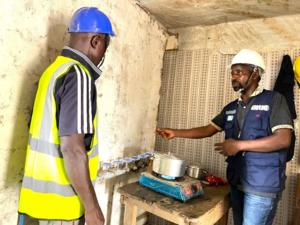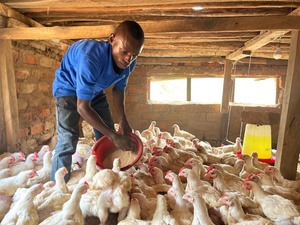The power of a fishpond

The power of a fishpond
As insecurity haunts Nigerians in the North-East, vulnerable women discover how a UNHCR-funded livelihoods project makes them less vulnerable.
“I am very happy because I see them grow”, says Yagana Aljahi, a mother of eight children, about the fish in her ponds. “Before, I had to knit caps to survive somehow, but with the fish, I will be able to provide for my family and for my children’s education.” Selling knitted caps is a popular activity, and prices are low.
Alhaji fled Nsganzai for Maiduguri, the capital of Borno State in North-East Nigeria, six years ago. The insurgency by the non-state armed group Boko Haram tyrannized their village, and she had to flee. Separated from her husband, she has to care for her family alone.
Yagana Alhaji is one of 100 internally displaced people, mainly women, who started fish farming in groups of ten in Bakassi IDP Camp in the State capital Maiduguri.
This UNHCR-funded livelihoods project which is carried out with the American University of Nigeria, aims at empowering them to stand on their own feet by giving them sustainable ways of earning an income which directly helps them meet basic needs and makes them less vulnerable to protection risks. Targeted capacity development which focuses on skills and existing knowledge, is combined with the necessary materials and funds to kickstart their business.
Many people in the Lake Chad Basin were fishermen and fisherwomen, and UNHCR’s livelihood experts found a high demand for fish in Borno State where fish trade used to be a thriving business before the insurgency.
Fishlings provided by UNHCR need food and care for several months before they reach a good size for being harvested and sold. A cat fish of one to 1.2 kg went for 1,200 Naira (some USD 2.40) at the time of writing. They are bred in stages in different ponds so that Yagana Alhaji and the other participants have a regular income at different times of the year.
In 2020, UNHCR, the UN Refugee Agency, supported the livelihoods of some 7,000 vulnerable returnees and IDPs in North-East Nigeria like Yagana Alhaji. Trainings offered ranged from shoe making to tailoring. Other trades or small-scale businesses supported included carpentry, groundnut oil extraction, poultry and pillow making across Adama, Borno and Yobe States.
More & more private & public donors support livelihoods
More and more donors support UNHCR’s work for self-reliance, including from the private sector such as the Lagos-based NGO Grooming Centre who is dedicated to support poor people engaged in trading and productive activities with limited means to start a business. The organization is currently supporting IDPs in the Northeast through UNHCR. Other donors to UNHCR’s livelihoods activities include the Nigerian Humanitarian Fund, that promotes partnerships and received contributions from Belgium, Canada, Germany, Ireland, the Republic of Korea, the Netherlands, Norway, Qatar, Sweden and Switzerland in 2020. In addition, the government and people of Japan continue their support to UNHCR’s livelihoods activities, especially for women, in 2021.
North-East Nigeria is home to some 2.1 million internally displaced men, women and children out of the 2.9 million across Nigeria.
Yagana Alhaji wants to sell her fish on the markets in and outside the camp, but she does not stop there. Having started with 600 fishlings initially, she has already fenced off an area in front of her humble house in the camp to put up an additional fishpond there. “My hope”, she says, “is that, when the fish business expands, I can also support others.”










